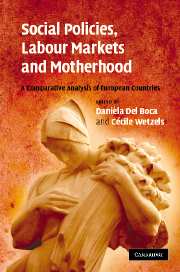Book contents
- Frontmatter
- Contents
- List of figures
- List of tables
- List of contributors
- Preface
- Part I
- 1 The position of mothers in a comparative welfare state perspective
- 2 Making time for working parents: comparing public childcare provision
- 3 Parents' care and career: comparing parental leave policies
- 4 Support for market care: comparing child cash and tax benefits
- Part II
- Part III
- Index
- References
3 - Parents' care and career: comparing parental leave policies
Published online by Cambridge University Press: 22 September 2009
- Frontmatter
- Contents
- List of figures
- List of tables
- List of contributors
- Preface
- Part I
- 1 The position of mothers in a comparative welfare state perspective
- 2 Making time for working parents: comparing public childcare provision
- 3 Parents' care and career: comparing parental leave policies
- 4 Support for market care: comparing child cash and tax benefits
- Part II
- Part III
- Index
- References
Summary
Introduction
The presence of young children in the household makes it necessary for working parents to find ways in which to combine professional responsibilities and care tasks. The externalisation of household chores to the market frees time for parents to spend on their caring duties. Furthermore, public childcare allows for a further externalisation of care tasks and as such is supportive of working parents, because it also secures time for both parents. As stated in chapter 2, a childcare system that meets several conditions (universal access, all-day coverage, high quality and affordability) facilitates an adequate division by parents of their time between childcare and work. However, given the high public cost of an affordable and universally accessible childcare system for children under 6 years of age, some countries have found an alternative in a parental leave system. The state's involvement in parental leave schemes may also be related to the way a country conceives children's early socialisation: through private external care, through public facilities or through parental care (Martin 2003). In many countries, parents are expected to be the primary caregivers when the child is very young (Math and Meilland 2004). Be that as it may, if home parental care is privileged in a given country, it does not necessarily mean that the state intervenes in the family sphere to secure parents' work resumption or substantial replacement of income.
- Type
- Chapter
- Information
- Social Policies, Labour Markets and MotherhoodA Comparative Analysis of European Countries, pp. 63 - 106Publisher: Cambridge University PressPrint publication year: 2008
References
- 6
- Cited by



